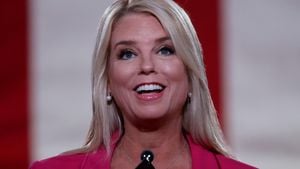After years of speculation and preparation, Priyanka Gandhi Vadra has stepped onto the political stage as the newly elected Member of Parliament for Wayanad, Kerala. This recent victory marks not just her debut in Parliament but also reflects her family's enduring legacy within Indian politics. With a record margin exceeding 5.64 lakh votes against Sathyan Mokeri of the Communist Party of India (CPI), her success has invigorated Congress supporters who view her ascent as both timely and necessary for the party's revival.
Priyanka's foray is particularly significant as it reunites all three prominent members of the Nehru-Gandhi family—Sonia Gandhi, Rahul Gandhi, and Priyanka—as they serve together in Parliament for the first time. This trifecta holds potential for political maneuvering against the backdrop of diminishing influence faced by the Congress party during recent electoral battles.
Yuval Harari, the renowned author and historian, effectively captured the mood surrounding the election when he emphasized the necessity for political families to adapt to changing landscapes—an aspect the Congress family is now grappling with. Despite scrutiny over their political dynasties, many see Priyanka as the breath of fresh air the party needs.
Priyanka's victory is not merely about winning votes; it's deeply intertwined with her personal narrative, which has been shaped by family tragedy and resilience. Her early political life began at her father's assassination site and has since evolved as she navigated the complex world of Indian politics, initially maintaining a lower profile to prioritize her family.
Who can forget her poignant recollection of 1998, where she first addressed crowds and whispered, 'Congressukku vote podungal,' igniting her initial following? That initial glimmer has slowly amplified over decades, culminating now with the hopes of millions resting on her shoulders. Interestingly, people flocked to her campaign not solely out of loyalty to the Gandhi name, but also drawn by her authenticity and willingness to tackle pressing issues.
During her campaign, Priyanka tackled real concerns facing Wayanad, particularly the aftermath of devastating floods. She criticized the BJP's government for refusing to declare the floods as a national disaster, emphasizing, ‘This isn’t just negligence; it is shocking injustice to those who have suffered unimaginable loss. The people of Wayanad deserve so much more.’ Her empathetic approach has struck chords, leading many to connect with her insistence on social justice.
The campaigning period itself had its fair share of challenges, with rallying sentiments around local issues, such as travel bans affecting residents' mobility to and from Karnataka. Despite criticism around her being perceived as the 'parachuted candidate', she effectively turned these debates back on her brother, Rahuls' constituency work, portraying her as not just another political candidate, but as someone deeply invested and committed to her constituents.
Priyanka's road to this moment included pivotal interactions with farmers and various marginalized groups, enhancing her grassroots approach to campaign politics. She became familiar with the struggles of common people. "The struggle isn’t just about one seat but encompasses the fight for the dignity of our farmers, the women who toil daily, and the youth who look for job opportunities across the state," she announced, portraying herself as their champion.
Her ability to connect with voters on emotional and rational planes marked her campaign’s progress. Priyanka was often seen at local gatherings or rallying on streets with her son Raihan—adding to her image as the relatable politician balancing personal and public life adeptly.
The excitement generated during the campaign frequently overpowered speculation surrounding her political intent, leading many to dismiss notions of her being unworthy of her position due to ‘nepo politics’. Opposition from the BJP has been persistent, often questioning the Congress's capacity to generate meaningful leadership. Yet, with Congress's rejuvenation following her victory, their fears may prove uncanny.
Rahul's abstaining from Wayanad to serve Rae Bareli has also raised eyebrows, yet Priyanka appears ready to build her legacy, not overshadowed by her brother's previous challenges. Political analysts point out her capacity as potentially redefining the party's dynamics and its outreach abilities moving forward.
Priyanka has been lauded for her charismatic speaking style, akin to family traits reminiscent of her grandmother, Indira Gandhi. Her presence on-stage showcased the raw emotional drive she connected during speeches with the audience, fostering trust and open dialogue. And as she takes her position among Parliament’s ranks, the hopes for dynamic change remain high.
Yet, political scientists have raised concerns; her arrival doesn’t automatically signify the pivotal shift the Congress might need. The party faces the looming question of whether her leadership can reinvigorate its prospects or whether existing systemic issues will continue to hinder growth.
She has publicly acknowledged these sentiments, saying: "I know there’s work to be done. I promise to be more than just my brother’s substitute. It’s time we re-think, re-engage, and reflect collective aspirations together.” Her assertion signals awareness of the immense expectations poised on her shoulders.
Overall, her first decisive victory heralds both promise and challenge for not only Priyanka but the party as well. Advocates push for her to leverage this strong mandate to reinstate faith from disenfranchised voters across India. She’ll need to translate her campaign's passion and concern for Wayanad broadly, making meaningful connections as she embarks on her parliamentary path.
Priyanka Gandhi will soon learn: being celebrated as the heir to the Gandhi legacy is not simply about familial privilege but proving her mettle, responding to her voter base with dedication as she steps forth as their elected representative. Her office will see fierce action as her name writ large among the Congress banner speaks of pressing reforms sought by members of her constituency.
Priyanka’s victory is celebrated, but it has also opened dialogues about redefining political leadership within the Congress itself. Will she shape the future going forward, or will she navigate the complex nuances of being part of the larger historical fabric of Indian politics? Only time will tell, but for now, enthusiasm reigns as the people look forward to changes she promises to bring about.



